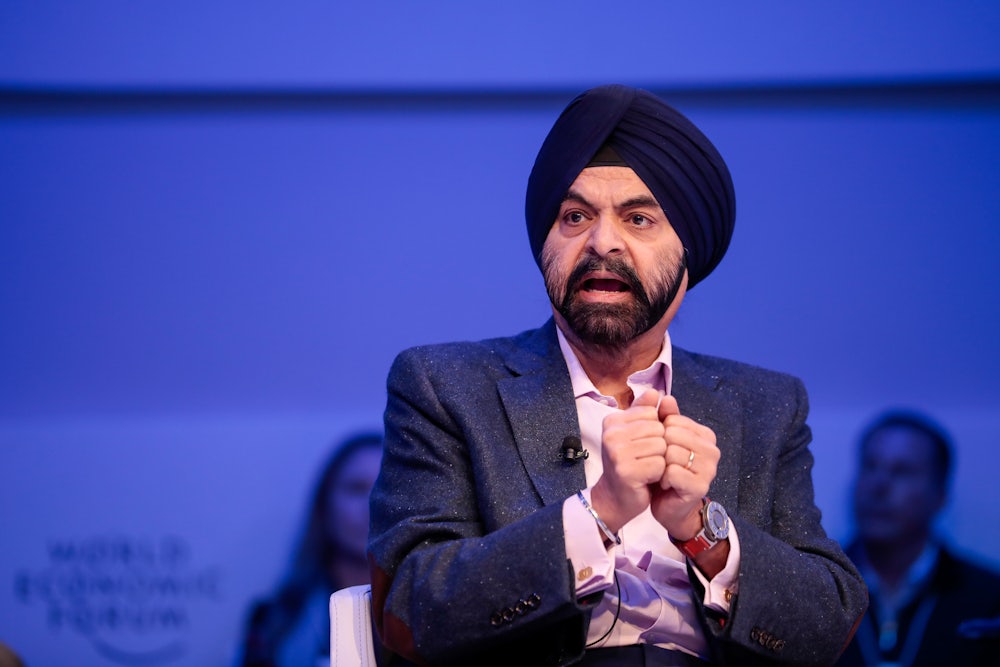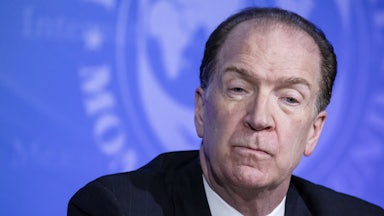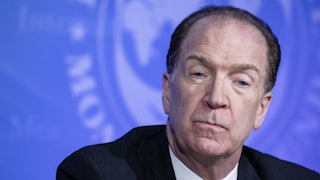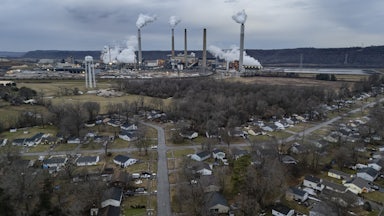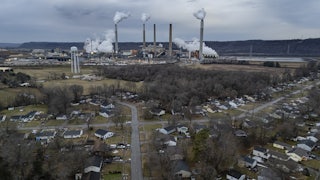In the days since Trump-appointed World Bank President David Malpass announced he will step down ahead of schedule, the White House has emphasized President Biden’s eagerness to appoint someone who will take climate change seriously. Malpass, after all, is leaving amid blowback over his comments last fall equivocating as to whether fossil fuels cause climate change. (They do.) And his successor will be tasked with implementing the bank’s “roadmap” to align itself with the Paris Agreement.
But on Thursday, Biden announced his intention to give the job to Ajay Banga, a financial-sector veteran lacking in both public-sector and climate experience. The choice speaks volumes about how this administration believes climate action will happen: with the private sector holding the reins.
Though there will be a formal nomination process, a “gentleman’s agreement” struck when the bank was founded means Biden’s pick is unlikely to face much opposition. Banga, notably, did not appear in speculative lists of climate-themed picks that included the likes of Michael Bloomberg, Al Gore, and John Kerry, now serving as Biden’s climate envoy. Even more telling, the Republican chair of the House Financial Services Committee, Congressman Patrick McHenry, praised Banga as a departure from the administration’s “radical climate and social agendas.”
Yet the administration’s messaging around Banga stresses that he was chosen with climate front of mind. Treasury Secretary Janet Yellen—who had been critical of Malpass—praised Banga as having experience that will allow him to “help mobilize the private capital and press for the reforms needed to meet our shared ambitions” on climate. Kerry similarly said that he “has proven his ability as a manager of large institutions, and understands investment and the mobilization of capital to power the green transition.” Vice President Kamala Harris commended Banga’s work co-chairing her Partnership for Central America, a “public-private partnership designed to address the root causes of migration,” which, she suggested, shows his aptitude for “addressing pressing global challenges, including climate change.”
So what’s going on here? Laying Biden officials’ comments alongside Banga’s record, a pattern emerges—and it says a lot about where the Biden administration really stands on climate change.
Banga spent 11 years as the CEO of Mastercard before joining the private equity firm General Atlantic as vice chairman. In 2020 he was elected chairman of the International Chamber of Commerce, a business lobby known for—among other things—hosting Investor-State Dispute Settlement tribunals that allow companies to sue sovereign governments if they believe them to be posing a threat to current or expected profits. (He now serves as its honorary chairman.) Banga was also a board member at Dow Chemical and worked stints in senior positions at Citigroup, Nestle, and PepsiCo.
As is fashionable among CEOs, Banga occasionally talks about rising temperatures. Though not especially vocal on the issue, he has participated in corporate-climate partnerships that enlist companies under vague missions to make the world a greener place. Banga is an adviser to General Atlantic’s “climate growth equity venture” BeyondNetZero. According to the group’s chairman, former BP CEO Lord John Brown, BeyondNetZero “invests in companies delivering practical solutions to the many problems of climate change but only if they are prepared to set rigorous and independently verified annual science-based targets and have their performance independently measured.”
While at Mastercard, Banga created something called the Priceless Planet Coalition, whose activities include selling off tickets to golf tournaments (“Priceless Experiences”) that benefit conservation nonprofits. All proceeds from its ticket sales to the Arnold Palmer Invitational, for instance, go to Priceless Planet Coalition partner Conservation International, one of the world’s largest green nongovernmental organizations.
The group’s work selling corporations carbon offsets—credits purchased to offset emissions with tree planting or forest protection efforts elsewhere—has been ensnared in a controversy over bad accounting, i.e., whether carbon credits sold actually correspond to emissions reductions. A report last November found that more than 90 percent of rainforest carbon-offset credits rubber-stamped by Verra—a third-party contractor Conservation International works with to verify its own offset offerings—are “phantom credits” that “do not represent genuine carbon reductions.”
Among the offset projects that did show positive results was a protected area twice the size of New York City in Peru, touted by Conservation International and Verra as a counterweight to critical reports about the value of offset schemes. A recent Guardian investigation found video evidence that several people have been displaced from their homes in the area by armed park authorities. Conservation International told the paper that it “takes the reports very seriously” and had assurances that “no homes that were inhabited had been cleared” and that “the community had been informed well ahead of time that the buildings were to come down.”
Banga, to be sure, has only tangential connections to this group. But the overall pattern of his interaction with the climate issue is clear, and shows what kind of climate action the White House seems to think is needed at the World Bank: getting the private sector doing something it can call green. While several Cabinet officials’ endorsements of Banga have included some variation on the word “transformative,” his watery lip service to cutting emissions is well in keeping with the World Bank’s track record. An analysis published last year by Oxfam found that the $17.2 billion in climate finance the bank reports having delivered in 2020 may be off by as much as $7 billion.
A White House interested in a genuinely transformative approach to the World Bank, as I argued last week, might have moved to end the gentleman’s agreement with Europe and support a more democratic process for choosing Malpass’s successor. Even within that constrained process, however, Banga is an uninspiring pick, seemingly poised to double down on the bank’s track record of prioritizing the private sector and apportioning whatever public funds are available to governments as loans, which accounted for roughly 70 percent of the public climate finance provisioned in 2020. Sixty percent of low-income countries, meanwhile—many of them climate-vulnerable countries—are at high risk of or already in debt distress.
For the Biden administration, the private sector still seems to possess a mythical capacity to make dreams come true. Maybe it hopes Banga will be able to entice fellow executives to “mobilize,” in Yellen’s and Kerry’s words, unprecedented funding for climate mitigation and adaptation, whether through personal relationships or willingness to approach rising temperatures as an investment opportunity. No one, though, should hold their breath waiting for the World Bank to become some kind of climate champion under his watch.
